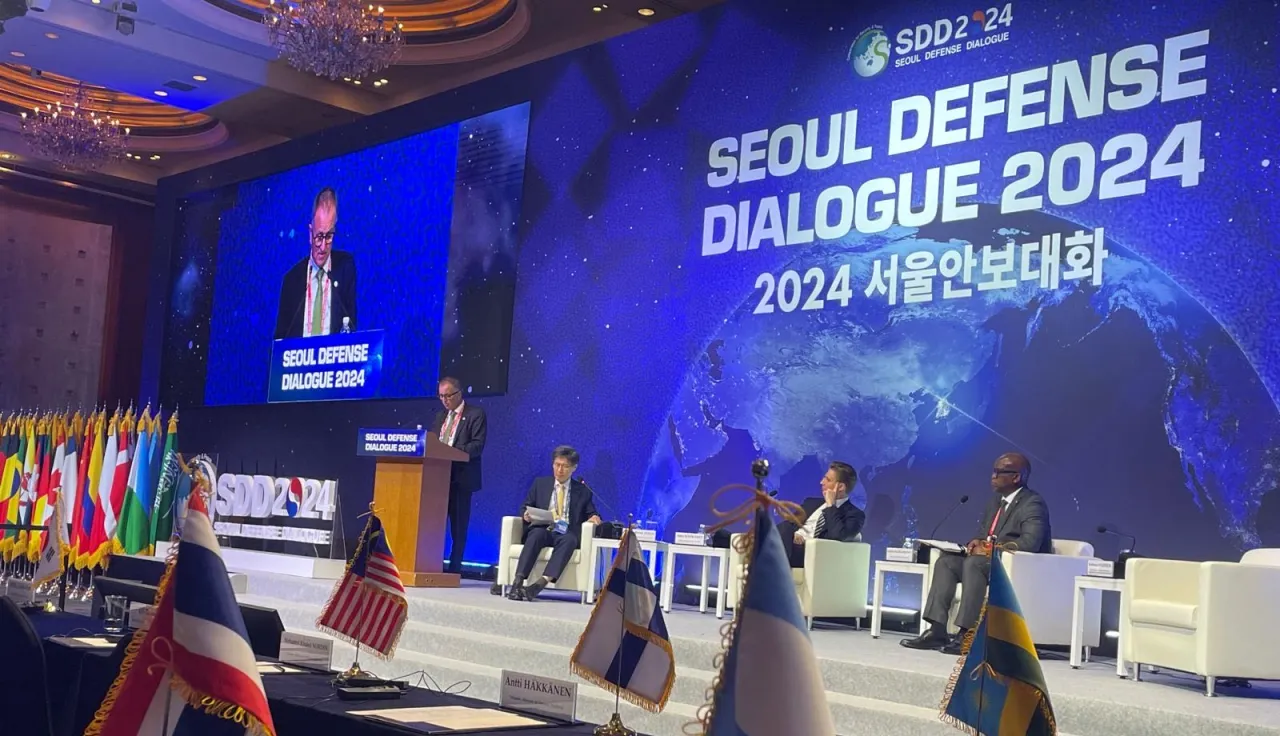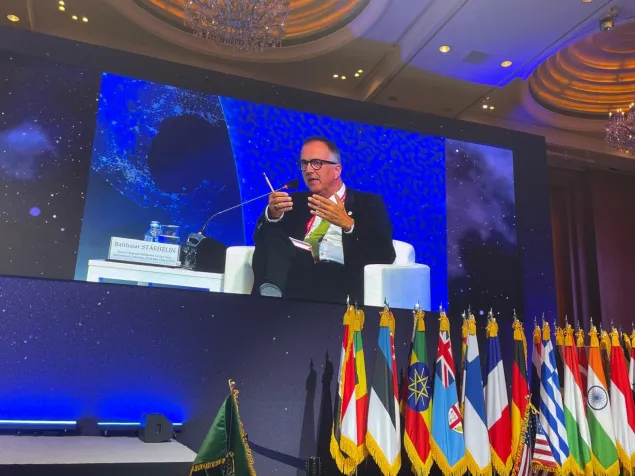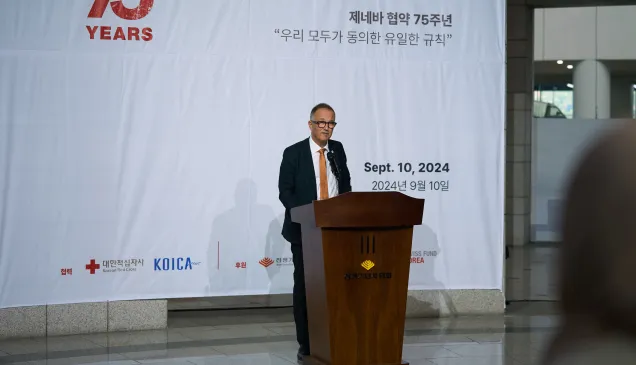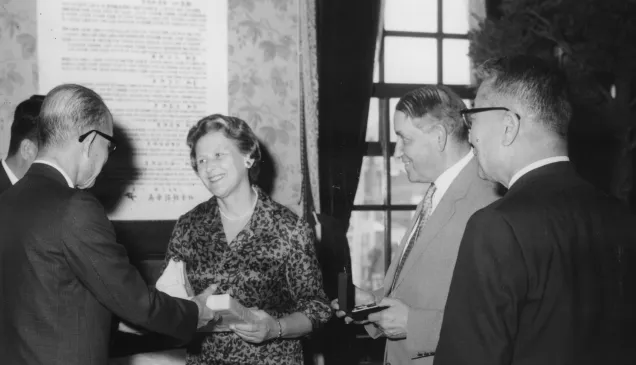Republic of Korea: Upholding humanitarian principles amid security crises in an interconnected world

Panel remarks by Balthasar Staehelin, Personal Envoy and Head of Regional Delegation for East Asia at the International Committee of the Red Cross (ICRC), during the Third Plenary Session on "Addressing Multiple Security Crises in an Interconnected World" at the Seoul Defense Dialogue 2024 on September 11, 2024.
Excellencies, Ladies and gentlemen,
First, I thank the Ministry of National Defense of the Republic of Korea for inviting the International Committee of the Red Cross (ICRC) to the 13th edition of the Seoul Defense Dialogue. This is the first time that the ICRC is attending this forum and sharing a humanitarian perspective on the multitude of global crises we see around us.
2024 is a year of striking paradoxes:
This year has seen an alarming escalation in global violence, with around 120 active armed conflicts—a figure that has more than tripled over the past three decades. These conflicts ripple across borders, uprooting countless lives, obliterating essential infrastructure, and leaving irreparable damage to the environment.
Yet, 2024 also marks the 75th anniversary of the Geneva Conventions. On August 12, 1949, in the aftermath of World War II’s devastation, the world came together to unanimously approve these foundational treaties. The Geneva Conventions set the cornerstone of international humanitarian law, aiming to protect those who are not or are no longer engaged in hostilities and to restrict the means and methods of warfare to prevent unnecessary suffering. The adoption of these conventions was the international community’s collective cry in response to the humanitarian horrors of World War II: NEVER AGAIN.
The premise of these Conventions is simple, more than four hundred articles all come down to a unique universal consensus: Even in armed conflict, at the worst of times, the core of our common humanity must be preserved.
However, when we see a proliferation of armed conflicts around the world, the fact becomes clear: the Geneva Conventions are under strain.
In Ukraine, we see devastated cities, displaced families, and shattered lives.
In Mali, we see women and children struggling for survival against a deadly combination of conflict, climate shocks and food insecurity.
In Syria, we see communities ravaged by years of fighting and young adults without any hopeful future in sight.
In Myanmar, we see wounded and sick struggle without adequate healthcare, children malnourished amid fields sown with mines instead of seeds.
As we speak, countless civilians in conflicts around the world are experiencing a living hell.

In parallel, humanitarian action is increasingly prevented, and humanitarian workers are targeted. Neutral and impartial providers of humanitarian assistance and protection, such as the ICRC, are regularly pressured to pursue political or military objectives.
In this context, the question arises: What can States do to bring about greater respect for international humanitarian law and ensure that the most vulnerable are protected and assisted? It is the responsibility of states that have committed to the Geneva Conventions and other treaties of international humanitarian law to find the answer to this question.
From the ICRC, I would like to make two calls today at this important gathering:
- States should demonstrate leadership in compliance with international humanitarian law; and
- States should respect the humanitarian space of impartial humanitarian organizations.
First, States should lead in promoting IHL respect and compliance.
The principle of humanity underpinning IHL is a value shared by the whole international community through the universal ratification of the Geneva Conventions. In this time of polarized public opinion, it is fundamental for States to reaffirm this shared commitment to humanity and to make compliance with IHL and respect for the humanitarian values that underpin it their political priority. Not doing so, in the context of the devasting impact of armed conflict, would be a moral failing. Because war without limits equals suffering without end.
The humanitarian imperative is clear. But what does IHL compliance look like in practice? It begins with States ratifying the key IHL treaties, but that is just the first step. Politicians, policymakers and military leaders must set the stage for compliance. They must implement the government’s IHL obligations into the domestic legal regime, giving the law teeth. The law must be holistically integrated into the doctrine, education, field training, operations orders, rules of engagement and military justice systems of their national armed forces. The measure of success of a State’s IHL implementation is not whether violations take place – as they exceptionally will in even the most compliant armed forces – but whether the military judicial system independently and expeditiously prosecutes violations, sending a strong message to the chain of command. States must champion the criminal repression of grave violations of IHL, not hinder it.
Second, States should enable neutral and impartial humanitarian access in armed conflicts.
This means access to civilians in need. Access to overcrowded detention facilities where we continue to see worrying trends in relation to ill-treatment and torture.
This also means ensuring the safety and protection of humanitarian and healthcare workers.
Meaningful protection and assistance of the civilian population during armed conflict fundamentally depends on the perception of neutrality and impartiality of humanitarian actors. When a Red Cross marked ICRC Land Cruiser travels through contested territory on its way to carry out a visit with prisoners of war, it is not protected by weapons or escorted by armed forces. Its civilian occupants are entirely vulnerable, other than relying on an image of neutrality and impartiality in the eyes of the warring parties. At a checkpoint, they depend on the armed forces’ understanding that their work is focused solely on the humanitarian needs of affected populations. However, if social media falsely reports that ICRC has taken sides with one side or that it is neglecting one group while helping another for political reasons, the safety, access, and operational capability of those humanitarian workers is questioned.
On this point, international humanitarian law is very clear: the parties to armed conflict are obliged to allow and facilitate rapid and unimpeded passage of impartial humanitarian relief for civilians in need. What is less clear is how ICRC can persuade malicious actors not to circulate falsehoods about its operations. This is where ICRC relies on you, the parties to the Geneva Conventions, to counteract misinformation, disinformation and hate speech directed at the humanitarian mission. To broadcast to the world that it is in the best interests of the parties to the Geneva Conventions to ensure that neutral and impartial humanitarian organizations protect and assist the most vulnerable.
Ladies and gentlemen,
Your position, influence, and role put you in a unique position not only to make a genuine difference for the many people currently suffering the consequences of ongoing armed conflicts but also to prevent such suffering from happening in the future. Doing this will be a fitting tribute to all that the Geneva Conventions stand for.
To conclude, allow me to emphasize that respecting and complying with international humanitarian law reduces the cost of war while maintaining a pathway to ceasefire agreements and eventually to lasting peace, functioning economies, and a healthy natural environment. In times of compounding global trends and geopolitical tensions, compliance with international humanitarian law must become a political priority.
Thank you.



